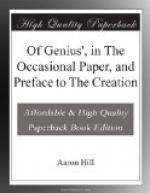There seems to be in Man a Composition of natural Powers and Capacities, not unlike to these. From hence I would take the first Original of their distinguishing Genij. The Words by which they are usually explain’d, have a manifest Allusion hereto. Thus we say of some Men, they have a brisk and airy Genius; of others, they have a strong and active Genius, a quick and lively Spirit, a grave and solemn Temper, and the like. The different readiness of Apprehension, strength of Judgment, vivacity of Fancy and Imagination, with a more or less active Disposition, and the several Mixtures of which these Powers are capable, are sufficient to explain this. They may shew us how some have a particular Genius for Wit and Humour, others for Thought and Speculation. Whence it is, some love a constant and persevering Application to whatever they undertake; and others are continually jumping from one Thing to another, without finishing any thing at all.
But we do not only consider in Musick these Materials, as I may call them, of which it is composed; but also the Style and Manner. This diversifies the Genius of the Composer, and produces the most sensible and touching Difference. There is in all Musick the natural difference of Tone and Measure. They are to be found in the most vulgar Compositions of a Jig or an Hornpipe. But it is a full Knowledge of the Force and Power of Sounds, and a judicial Application of them to the several Intentions of Musick, that forms the Style of a Purcel or Corelli. This is owing to successive Improvements. The Ear is formed to an elegant Judgment by Degrees. What is harsh and harmonious is discovered and corrected. By many Advantages, some at last come to find out what, in the whole Compass of Sounds, is most soft and touching, most brisk and enlivening, most lofty and elevating. So that whatever the Artist intends, whether to set an Air, or compose a Te Deum, he does either, with an equal Genius, that is, with equal Propriety and Elegance. Thus long ago,
Timotheus to
his breathing flute, and sounding Lyre,
Could swell the
Soul to Rage, or kindle soft Desire.
And,
Thus David’s
Lyre did Saul’s wild Rage controul,
And tune the harsh
Disorders of his Soul.
This may direct us to another Cause, from whence a Genius arises: A Genius that is formed and acquired. For the Turn that Education, Company, Business, the Taste of the Age, and above all, Principles of vitious or virtuous Manners, give to a Man’s natural Capacities, is what chiefly forms his Genius. Thus we say of some, they have a rude unpolish’d Genius; of others, they have a fine, polite Genius. The manner of applying the natural Powers of the Mind, is what alone may produce the most different and opposite Genij. Libertine Principles, and Virtuous Morals, may form the Genius of a Rake, from the same natural Capacity, out of which Virtuous Principles might have form’d an Hero.




